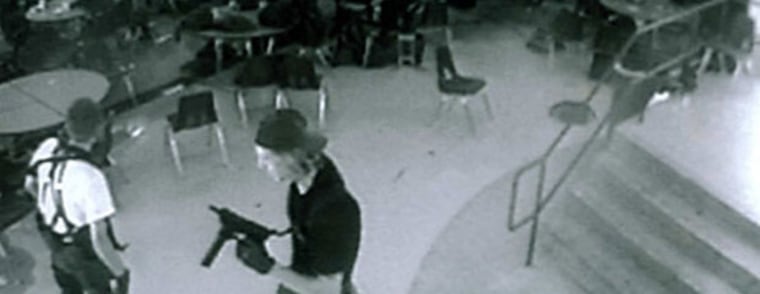It was 13 years ago today that teenagers Eric Harris and Dylan Klebold opened fire at Columbine High School, injuring dozens and killing 12 students and 1 teacher before turning their guns on themselves. The incident is the fourth-deadliest school massacre in U.S. history, and the deadliest for an American high school.
The massacre prompted a nationwide discussion about gun control and security in schools. Many schools implemented new security measures, including metal detectors and security guards, to screen students as they entered the campus. Lockdown drills became common for elementary through high schools (I remember many afternoons spent learning the do's and don'ts of hiding from a shooter). Police forces popularized the use of the Immediate Action Rapid Deployment tactic to respond to situations where there is an active shooter.
Tighter gun control laws, particularly for minors, were also introduced across the country at the turn of the century. The month following the Columbine massacre, the Senate voted on a measure that would require background checks in order to purchase firearms at gun shows and would require safety devices for new guns that are sold.
However, it seems the impact of the Columbine massacre hasn't slowed the National Rifle Association a bit.
As Rachel Maddow reported on her show last night, the NRA's reinforcement of pro-gun orthodoxy has consistently challenged anti-gun advocates on the grounds of the Second Amendment. In 2004, Congress allowed a 10-year ban on the sale of 19 types of assault weapons to expire after Congress failed to send an extension of the bill to then-President George W. Bush in 2000. And a government review in 2010 showed that over 200 people on the federal terrorism watch list purchased guns during that year.
It wasn't until after the Virginia Tech massacre in 2007 -- the deadliest shooting in U.S. history by a single gunman -- that the first major federal gun control measure in over a decade was signed by President Bush. The new law created a background check system to screen prospective firearms purchasers. According to the FBI, purchases of handguns and rifles nearly doubled between 2006 and 2011, and background check requests from licensed dealers rose 15 percent from the previous year.
Yet, despite the string of gun violence still seen today at schools (most notably February's shooting at Chardon High School that killed 3 students and injured 3 others), and in the wake of recent tragic shootings (from the 2011 Tucson shooting where Rep. Gabby Giffords (D-AZ) and 18 other people were shot, to the death of Trayvon Martin), the NRA is still challenging gun control laws.
Last year, the NRA challenged a law that would prohibit licensed dealers to sell handguns to minors, a challenge that was dismissed by a federal judge in Texas, and they have consistently opposed laws requiring criminal background checks and proof of identification for gun sales.
While the Second Amendment -- and the 2008 District of Columbia v. Heller Supreme Court ruling -- protects the rights of individual citizens to keep and bear arms, I have to wonder exactly who the NRA is supporting we "keep and bear arms" against in our schools, in city halls and libraries, and on the streets of our own neighborhoods.
